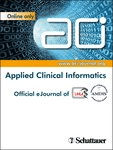
Applied Clinical Informatics
Scope & Guideline
Unlocking the potential of health informatics for improved care.
Introduction
Aims and Scopes
- Clinical Decision Support Systems (CDSS):
The journal publishes research on the design, implementation, and evaluation of clinical decision support systems that assist healthcare providers in making informed clinical decisions. - Health Information Technology (HIT) Integration:
Research articles often focus on the integration of health information technologies into clinical workflows, examining how these technologies can streamline processes and enhance patient care. - Patient Engagement and Digital Health:
Studies related to patient engagement, including the use of patient portals and mobile health applications, are a significant focus, highlighting how technology can empower patients in their healthcare journey. - Data Analytics and Machine Learning:
The journal features research employing data analytics and machine learning techniques to improve predictive models, patient outcomes, and clinical decision-making. - Usability and Human Factors in Health Informatics:
Research addressing the usability of health informatics tools and systems, emphasizing the importance of user-centered design in improving clinician experiences and reducing documentation burden. - Telehealth and Remote Monitoring:
The increasing relevance of telehealth and remote patient monitoring solutions is explored, especially in response to the challenges posed by the COVID-19 pandemic.
Trending and Emerging
- Artificial Intelligence and Machine Learning in Healthcare:
Research utilizing AI and machine learning to enhance clinical decision support, predictive analytics, and personalized medicine is on the rise, showcasing the potential of these technologies in transforming healthcare. - Interoperability and Data Sharing:
Emerging studies emphasize the importance of interoperability among health information systems, focusing on how seamless data sharing can improve care coordination and patient outcomes. - Health Equity and Social Determinants of Health:
An increasing focus on health equity, including the impact of social determinants of health on patient outcomes, reflects a broader movement towards addressing disparities in healthcare access and outcomes. - Innovative Telehealth Solutions:
With the ongoing evolution of telehealth, research exploring new telehealth models, technologies, and their effectiveness in various clinical settings is gaining traction. - User-Centered Design and Human Factors Engineering:
There is a growing emphasis on incorporating user-centered design principles and human factors engineering in the development of health informatics tools to enhance usability and clinician satisfaction.
Declining or Waning
- Traditional Electronic Health Record (EHR) Studies:
Research focusing solely on the functionality and basic implementation of EHR systems has diminished, as the field moves towards more sophisticated applications of informatics. - Single-Site Implementation Studies:
There has been a noticeable decrease in studies that evaluate the implementation of informatics solutions in single healthcare settings, with a growing preference for multi-site or large-scale evaluations. - Generic Health IT Usability Studies:
The focus on generic usability studies without specific contextual applications has waned, as researchers increasingly seek to tailor usability assessments to specific health contexts or technologies.
Similar Journals
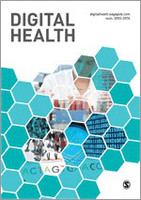
Digital Health
Transforming Health Through Digital Innovation.Digital Health is a pioneering open-access journal published by SAGE Publications Ltd, dedicated to advancing the field of health technology and its intersection with health policy, informatics, and the broader medical landscape. Since its inception in 2015, the journal has rapidly established itself as an essential resource for researchers, professionals, and students, serving as a platform for innovative research that leverages digital tools to improve health outcomes. Currently ranked in the Q2 category across four relevant domains, including Computer Science Applications and Health Informatics, it commands respect within the academic community. With its accessible framework, Digital Health facilitates the dissemination of critical findings and new methodologies that inform policy and practice. The journal’s commitment to open access promotes worldwide access and cooperation, making significant contributions to the evolving landscape of digital health.
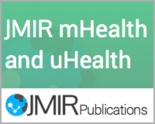
JMIR mHealth and uHealth
Innovating Patient Engagement through Mobile SolutionsJMIR mHealth and uHealth is a leading peer-reviewed journal that focuses on the innovative aspects of mobile health (mHealth) and the utilization of technology in health care, published by JMIR Publications, Inc. Since its inception in 2013, this Open Access journal has rapidly established itself as a vital resource in the realm of health informatics, currently ranked #13 out of 138 in the Scopus category of Medicine - Health Informatics, placing it in the top 10th percentile. With a Q1 ranking in Health Informatics for 2023, it is recognized for its high-quality research contributions and significant impact in shaping the future of health technology. The journal serves as an essential platform for researchers, professionals, and students seeking to advance their understanding of how mobile solutions can enhance health outcomes and patient engagement. Accessible to a global audience, JMIR mHealth and uHealth aims to foster collaboration and innovation in the fields of mHealth and uHealth, encouraging the dissemination of research that transforms health care practices.
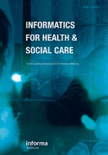
Informatics for Health & Social Care
Enhancing healthcare delivery with insightful research.Informatics for Health & Social Care is a leading journal published by Taylor & Francis Inc, dedicated to the intersection of health informatics and social care. With a strong emphasis on advancing knowledge in the fields of health information management and nursing, this journal has established itself as a vital resource for researchers and professionals seeking to explore innovative applications of informatics to improve patient outcomes and streamline healthcare delivery. Recognized for its influential contributions, it currently holds a Q2 ranking in both Health Informatics and Health Information Management, as well as a prestigious Q1 ranking in Nursing (miscellaneous) for 2023, signifying its critical role within the academic community. The journal is accessible for open access viewing, fostering a broader dissemination of research findings. Released continuously since 1976, it stands as a testament to the evolving landscape of health informatics, addressing pertinent issues and facilitating discussions that shape practices in health and social care delivery.

JAMIA Open
Advancing health informatics through open collaboration.JAMIA Open is an open-access journal dedicated to advancing the field of health informatics, published by Oxford University Press. Since its inception in 2018, the journal has provided a platform for novel research, reviews, and case studies that bridge the gap between healthcare and information technology. With an impressive impact factor and a current classification in the Q2 quartile for Health Informatics, JAMIA Open has established itself as a vital resource for researchers and practitioners alike, facilitating the dissemination of innovative findings that contribute to the evolution of healthcare systems. Based in the United States, the journal is committed to providing free and equitable access to high-quality research, thus promoting a collaborative and informed approach to tackling pressing health issues. As it continues to grow and evolve, JAMIA Open remains a cornerstone in the landscape of health informatics, appealing to a diverse audience of researchers, professionals, and students looking to inspire change in their fields.

JOURNAL OF MEDICAL INTERNET RESEARCH
Unlocking the Potential of Internet Technologies in HealthcareJOURNAL OF MEDICAL INTERNET RESEARCH, published by JMIR PUBLICATIONS, INC, stands as a pivotal resource in the field of Health Informatics, with an esteemed ranking of #7 out of 138 in the Scopus database, placing it in the top 95th percentile. Since its inception in 1999, this Open Access journal has been committed to disseminating high-quality, peer-reviewed research that explores the intersection of healthcare and internet technologies. With its headquarters in Toronto, Canada, the journal encompasses a broad range of topics, including eHealth, telemedicine, and mobile health innovations. The impact factor and its Q1 quartile ranking highlight the journal's significant influence and prevalence in advancing the understanding of digital health landscapes. Researchers, professionals, and students alike benefit from its valuable insights, making the JOURNAL OF MEDICAL INTERNET RESEARCH an essential tool for fostering informed practices and policy-making in the rapidly evolving domain of health informatics.

Journal of Biomedical Semantics
Unlocking Insights Through Semantic InnovationThe Journal of Biomedical Semantics is a prestigious open-access journal published by BMC since 2010, dedicated to advancing the field of biomedical informatics through the lens of semantics. With an ISSN of 2041-1480, this journal caters to an international audience from its base in the United Kingdom. It focuses on the convergence of computer science, health informatics, and information systems, providing a vital platform for innovative research and knowledge dissemination. The journal is ranked in the second and third quartiles across several relevant categories in 2023, including Q2 in Computer Networks and Communications and Q3 in both Computer Science Applications and Health Informatics. With Scopus rankings highlighting its relevance in various subfields, this journal serves as a critical resource for researchers, professionals, and students alike, promoting high-quality, peer-reviewed articles on topics encompassing advanced computational methods and semantic technologies in healthcare. As a fully open-access resource, it ensures broad accessibility of groundbreaking research findings, making vital contributions to the ever-evolving landscape of biomedical semantics.
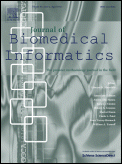
JOURNAL OF BIOMEDICAL INFORMATICS
Advancing healthcare through innovative informatics.JOURNAL OF BIOMEDICAL INFORMATICS, published by Academic Press Inc. Elsevier Science, is a premier peer-reviewed journal dedicated to the integration of computer science and health informatics to advance the field of biomedical engineering and healthcare. With its ISSN 1532-0464 and E-ISSN 1532-0480, this influential journal has established itself with an impressive impact factor, reflecting its high-quality research contributions. Recognized within the top quartile (Q1) of both Computer Science Applications and Health Informatics for 2023, the journal ranks #135 out of 817 in Computer Science Applications and #25 out of 138 in Health Informatics according to Scopus metrics. Offering open access options, it fosters extensive dissemination and accessibility of groundbreaking research findings to the scientific community. As a scholarly platform from 2001 to 2024, it is engineered to cater to the educational needs of researchers, professionals, and students, promoting innovative studies that bridge the gap between technology and healthcare.

Journal of Patient-Reported Outcomes
Elevating Patient Voices in Healthcare ResearchWelcome to the Journal of Patient-Reported Outcomes, a premier platform dedicated to advancing the field of health informatics and health information management. Published by SPRINGERNATURE since 2017, this Open Access journal allows researchers and practitioners globally to disseminate vital research findings, ensuring that insights into patient-reported outcomes reach a wider audience without barriers. With its current standing in the Q2 quartile for both Health Informatics and Health Information Management in 2023, it is positioned as a significant contributor to the healthcare research community, ranking 76th out of 138 in Medicine and 34th out of 59 in Health Professions. The journal aims to publish high-quality, peer-reviewed articles that explore innovative methodologies, enhance clinical decision-making, and ultimately improve patient care outcomes. By offering a platform for interdisciplinary collaboration, the Journal of Patient-Reported Outcomes fosters a deeper understanding of patients' perspectives in healthcare, making it an essential resource for researchers, professionals, and students alike.
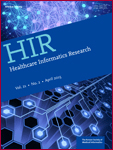
Healthcare Informatics Research
Pioneering the future of health informatics research.Healthcare Informatics Research, published by the Korean Society of Medical Informatics, is a leading open access journal that has been advancing the field of healthcare informatics since its inception in 2010. With an ISSN of 2093-3681 and E-ISSN of 2093-369X, the journal provides a vital platform for disseminating high-quality research aimed at improving healthcare systems through innovative informatics solutions. Recognized for its contributions, it holds a Q2 rank in Biomedical Engineering and Q3 rankings in both Health Informatics and Health Information Management for 2023, reflecting its stature within the academic community. The journal is committed to open access, ensuring that research is freely accessible to researchers, professionals, and students worldwide, thus promoting knowledge sharing and collaboration. Located in the dynamic city of Seoul, South Korea, the journal serves as a hub for groundbreaking studies that impact health systems globally, making it an essential resource for those at the forefront of healthcare technology and management.

Healthcare Technology Letters
Bridging the gap between technology and health outcomes.Healthcare Technology Letters is a leading open-access journal published by WILEY that has been at the forefront of disseminating cutting-edge research in the field of health informatics and health information management since its inception in 2014. With an E-ISSN of 2053-3713, this esteemed journal is recognized for its commitment to advancing knowledge and practice in healthcare technology, making it a vital resource for researchers, professionals, and students alike. The journal's scope encompasses a wide range of topics, including digital health solutions, data management, and innovative technologies that enhance patient care. It holds a respectable position in the academic community, featuring a Q3 ranking in both health informatics and health information management as of 2023, and consistently contributing to high-impact research evidenced by its Scopus rankings. By providing open access to its content since 2017, Healthcare Technology Letters ensures that valuable insights and breakthroughs can reach a broader audience, furthering the impact of its published work on the global health landscape.